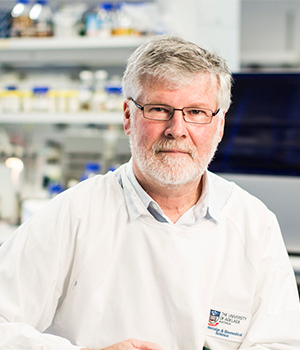Professor James Paton is SA Scientist of the Year
Saturday, 12 August 2017
 The University of Adelaide’s Professor James Paton is 2017 South Australian Scientist of the Year ─ and University of Adelaide staff won another four awards for excellence in science.
The University of Adelaide’s Professor James Paton is 2017 South Australian Scientist of the Year ─ and University of Adelaide staff won another four awards for excellence in science.
Announced last night as part of the South Australian Government’s Science Excellence Awards, the SA Scientist of the Year is the most prestigious science award in South Australia. Winners have demonstrated excellence in their field of science, and made an outstanding contribution in leadership that inspires others to become involved in science.
Professor James Paton, Director of the University’s Research Centre for Infectious Diseases, is a leading international researcher in the causes of infectious diseases. His research is focused on the fundamental molecular interactions between disease-causing bacteria and their hosts, and development of novel vaccines and therapeutics.
Infectious diseases continue to pose a major threat to humankind, particularly in the face of ever-increasing levels of resistance to antimicrobial drugs. Professor Paton leads a team of established and emerging researchers working together for improved health outcomes and reduced illness and mortality globally from infectious diseases.
Professor Paton obtained his PhD from the University of Adelaide in 1979, and spent 20 years at the Women’s and Children’s Hospital, as Head of Molecular Microbiology. He took up the Chair of Microbiology at the University of Adelaide in 2000. In 2007, he won a prestigious NHMRC Australia Fellowship, and was elected as a Fellow of the Australian Academy of Science in 2013.
Last night the University of Adelaide won a total of five awards including a winner in the Unsung Hero of SA categories and the Tall Poppy of the Year.
The Science Excellence Awards are the most prestigious of their kind in the state, and aim to showcase the critical importance of science and research to the development of industry and our society.
Other award winners are:
Excellence in Research Collaboration – Developing a world leading medical device in South Australia by the University’s Australian Centre for Visual Technologies, led by Professor Anton van den Hengel, and LBT Innovations.
The Automated Plate Assessment System (APAS) is an intelligent medical device technology for identifying microbiological growth on culture plates, which recently achieved first-in-class US Food and Drug Administration clearance. This represents international confirmation of the revolutionary technology involved, the impact it will have in medicine, and the opportunity it represents for all involved.
STEM Educator of the Year – won by Dr Claudia Szabo, Senior Lecture in the School of Computer Science and Associate Dean of Diversity and Inclusion in the Faculty of Engineering, Computer and Mathematical Sciences.
Dr Szabo is a passionate Computer Science lecturer who employs innovative and engaging techniques to
increase the engagement of her students with challenging computer science concepts. Her education research and
implementation of state-of-the-art curriculum design approaches has led to increased pass rates in her courses, and
she is recognised for her passion and achievements in improving student knowledge and understanding.
South Australia’s Tall Poppy – won by Dr Laura Weyrich, ARC DECRA Fellow in the Australian Centre for Ancient DNA.
Dr Weyrich’s research investigates the history of the human microbiome (the healthy bacteria that live in humans) using ancient DNA. She was the first person to reassemble the microbiome of an extinct species, the Neandertals, which captured global interest. Her work is providing new understanding about why many modern diseases are more prevalent in industrialised countries and how these may be linked to changes hundreds of years ago, and giving insights into past climate change.
Unsung heroes of SA: Science Communication – won by Dr Ian Musgrave, a molecular pharmacologist/toxicologist in the Adelaide Medical School.
Dr Musgrave has made an enormous contribution to the communication of science and to public commentary, through his willingness to engage with the media and the public on everyday science that needs scientific explanation. He has been a committee member of the South Australian branch of the Australian Science Communicators for many years and has been involved with numerous public science communication events, including ‘Kids Discover Neuroscience’, star-gazing events for the South Australian Air League and ‘Science in the Pub’.
Contact details
Email: media@adelaide.edu.au
Website: https://www.adelaide.edu.au/newsroom/
The University of Adelaide
Business: +61 8 8313 0814







